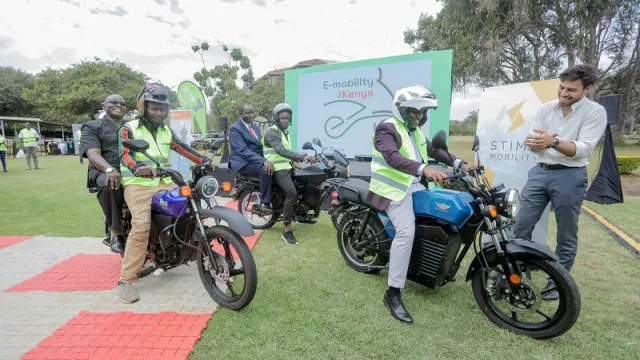Nairobi, Kajiado and Machakos to pilot electric boda bodas in green jobs deal

Nairobi, Kajiado and Machakos to pilot electric boda bodas in green jobs deal
Across Kenya, boda bodas keep gaining popularity as a means of transport because they are able to evade traffic and can access places where other means of mobility can't.
Their use, however, comes at a cost as riders have to put up with rising cost of fuel that is usually passed on to the passengers.
The scenario is expected to change after the KCB Foundation and the United Nations Institute for Training and Research (UNITAR) partnered to promote the use of electric motorbikes by Boda Boda riders in Kenya with a pilot phase in Nairobi, Kajiado and Machakos counties.
The deal, which is projected to onboard 150 riders, involves a user acceptance test, set up of a lending scheme, and the provision of safety driving skills through 2Jiajiri, Saccos, associations, motorcycle dealers, and various government departments to support the transition to clean energy.
KCB Foundation and UNITAR said the programme is part of the efforts in accelerating the transition to a low-carbon resilient economy and enabling transition of 25 percent of the total loan portfolio to green investments by 2025, as part of the KCB Net Zero ambition.
The pilot phase will cost approximately Kes38.7 million and will be financed by both KCB Foundation and UNITAR.
KCB CEO Paul Russo noted that the partnership with UNITAR is part of the multi-pronged approach by the regional lender to work with like-minded partners to support poverty alleviation and job creation.
Read also: Race for green PSV buses gathers pace as KCB, BasiGo Kenya strike financing deal
“Through the E-Mobility programme with UNITAR, we seek to make it possible for players in the transport sector to acquire electric motorbikes at an affordable rate and earn a living. At the same time, the Boda Boda riders will be playing a key role in supporting low carbon emissions in the environment. This is a cause we are ready and willing to support as part of our long-term plans to conserve the environment,” Mr Russo said.
Pius Masinde, the Conduct and Discipline Officer at the UN said, “This programme will promote electric mobility and ultimately contribute to the achievement of several Sustainable Development Goals (SDG) such as 1: End Poverty, 5: Gender Equality, 7: Affordable and Clean energy, 8: Decent work and Economic growth, 13: Climate Action and 16: Peace, Justice and Strong institutions. We look forward to upscaling the programme in 2023.”
According to the National Transport and Safety Authority, there were nearly 1.9 million registered bodabodas in Kenya as of 2018.
In 2021, NTSA registered 285,203 motorcycles compared to the 186,434 recorded in 2017.
The sub-sector provides more than one million direct jobs for riders who earn roughly less than US$10 a day. This translates to about Kes60 billion yearly in government revenue through taxes, levies and other charges.



